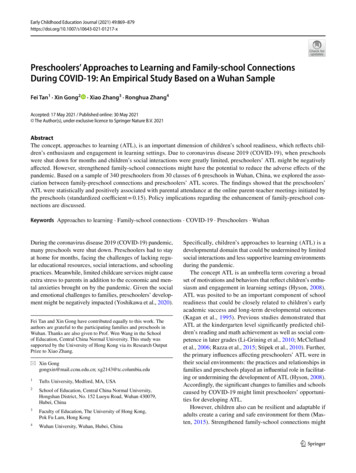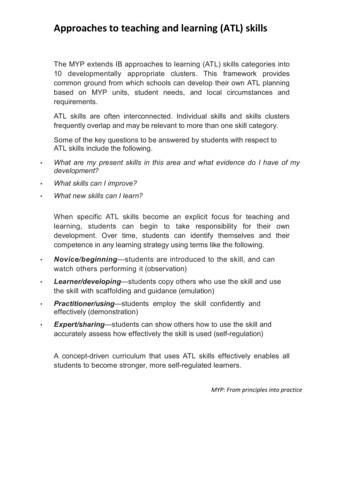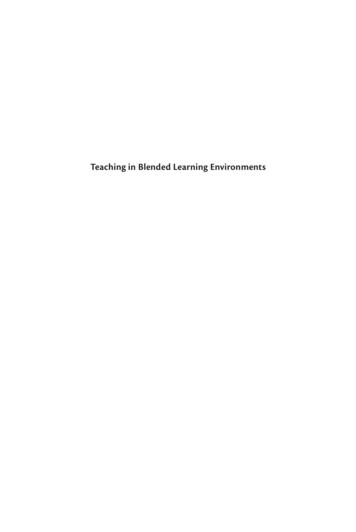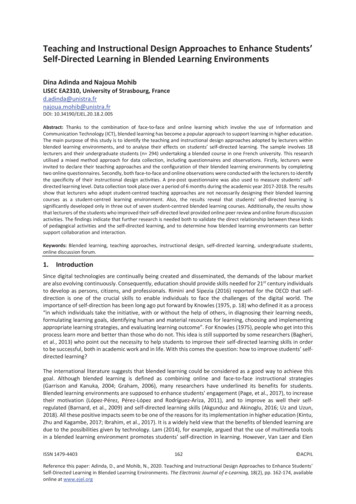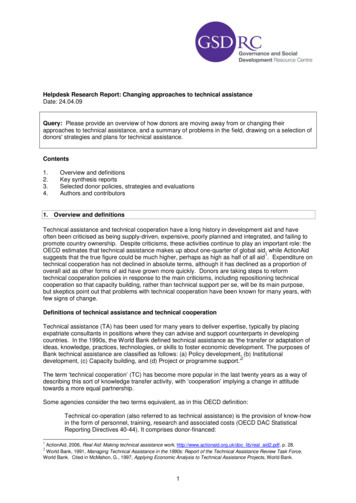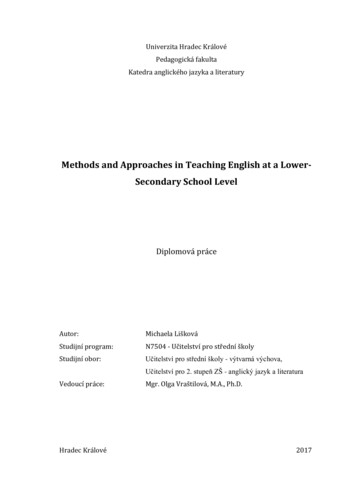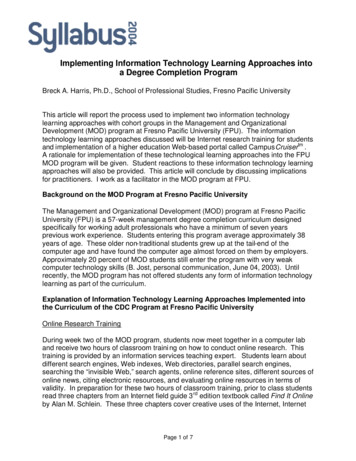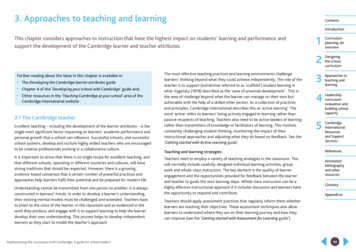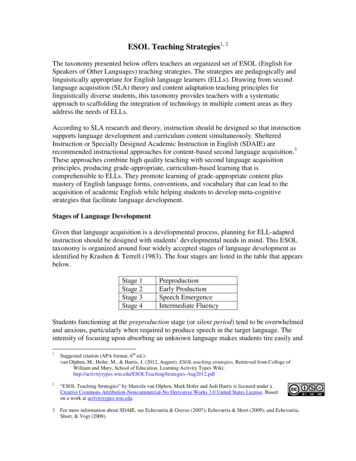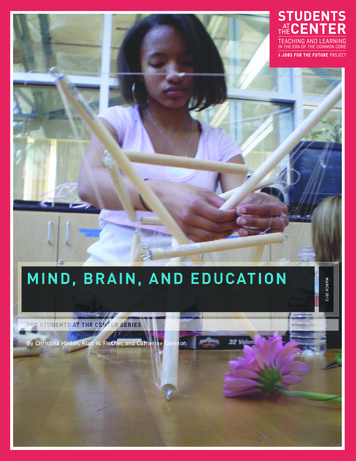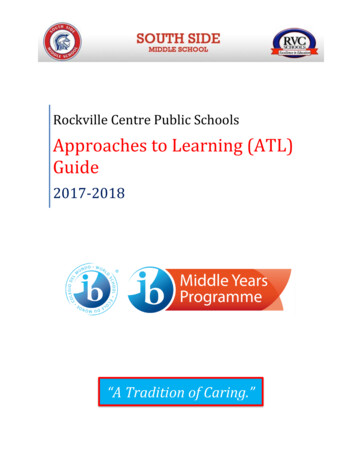
Transcription
Rockville Centre Public SchoolsApproaches to Learning (ATL)Guide2017-2018“A Tradition of Caring.”
Table of ContentsSouth Side Middle School and the International Baccalaureate (IB)Middle Years Programme (MYP)Page 2IB Mission Statement South Side Middle School Mission StatementPage 2Approaches to Learning (ATL)Pages 3 & 4Approaches to Learning and ResearchPages 4 & 5Approaches to Learning in the MYPPage 5MYP SchoolsPage 6ATLs and South Side Middle SchoolPages 6 & 7ATL Skills FrameworkCommunication: I. Communication SkillsPages 7 & 8Social: II. Collaborative SkillsPage 8Self-management:III. Organization SkillsPage 9IV. Affective SkillsPages 9 & 10V. Reflection SkillsPage 10Research:VI. Information Literacy SkillsPage 11VII. Media Literacy SkillsPages 11 & 12Thinking:VIII. Critical-Thinking SkillsPage 12IX. Creative-Thinking SkillsPages 12 & 13X. Transfer SkillsPage 13ReferencesPage 141
South Side Middle School and the International Baccalaureate (IB)Middle Years Programme (MYP)The MYP emphasizes intellectual challenge, encouraging students to make connections between their studiesin traditional subjects and the real world. It fosters the development of skills for communication, interculturalunderstanding and global engagement - qualities that are essential for life in the 21st century.South Side Middle School is an IB World School* offering the Middle Years Programme. IB World Schools sharea common philosophy: a commitment to high quality, challenging, international education that South SideMiddle School believes is important for our students.*Only schools authorized by the IB Organization can offer any of its four academic programmes: the PrimaryYears Programme (PYP), the Middle Years Programme (MYP), the Diploma Programme (DP) or the Careerrelated Programme (CP). For further information about the IB and its programmes, visit http://www.ibo.orgIB Mission StatementThe International Baccalaureate aims to develop inquiring, knowledgeable and caring young people who helpto create a better and more peaceful world through intercultural understanding and respect.To this end the organization works with school, governments and international organizations to developchallenging programmes of international education and rigorous assessment.These programmes encourage students across the world to become active, compassionate and life-longlearners who understand that other people, with their differences, can also be right.South Side Middle School Mission StatementSouth Side Middle School is a learning environment that provides students with opportunities to move towardthe goal of being independent learners and thinkers. Our goal is to provide experiences to help studentsunderstand their unique aptitudes and interests and be able to adjust to their rapidly changing environment,while meeting their unique physical, intellectual, social, and emotional needs.We strive to create a climate that enables students to develop a sense of self-worth, and have compassion andrespect for others by valuing individual differences. We facilitate a caring learning environment wherestudents feel safe, important and engaged. Our students demonstrate responsible global citizenship, and arecognizant of their place within the school community.In this success-oriented environment, we provide opportunities for exploration and risk-taking. The structureof the school day is designed to permit students to reach the standards established by the New York StateBoard of Regents, while adhering to the Common Core State Standards and embracing the framework of theIB Middle Years Programme. Our vision is to create life-long learners who seek to attain balance in all thatthey do.2
Approaches to Learning (ATL)“Learning how to Learn”Through Approaches to Learning in IB programmes, students develop skills that haverelevance across the curriculum that help them ‘learn how to learn’. ATL skills can be learnedand taught, improved with practice and developed incrementally. They provide a solidfoundation for learning independently and with others. ATL represent the skills that studentsneed in order to become self-regulated, intrinsically motivated learners.ATL skills help students prepare for, and demonstrate learning through, meaningfulassessment. They provide a common language that students and teachers can use to reflecton, and articulate on, the process of learning. IB programmes identify 5 ATL skill categories,expanded into developmentally appropriate skill clusters; there are 10 developmentallyappropriate Middle Years Programme (MYP) ATL skill clusters (MYP: FPIP, 2014, p. 20 & 97).IB Skill CategoryMYP Skill ClustersCommunicationI. CommunicationSocialII. CollaborationSelf-managementIII. OrganizationIV. AffectiveV. ReflectionResearchVI. Information LiteracyVII. Media LiteracyThinkingVIII. CriticalIX. CreativeX. TransferIn the Diploma Programme (DP), as well as in the Primary Years Programme (PYP) andMiddle Years Programme (MYP), these cognitive, metacognitive and affective skills aregrouped into the same five ATL categories. Although these skills areas are presented asdistinct categories, there are obviously close links and areas of overlap between them, and it isintended that these categories should be seen as interrelated. It is also the intention that3
these ATL skills should be seen as linking closely with the attitudes and dispositions identifiedin the IB learner profile. The learner profile is the IB mission statement translated into a set oflearning outcomes for the 21st century. It is an easily communicated set of ideals that caninspire, motivate and focus the work of schools and teachers, uniting them in a commonpurpose (www.ibo.org).Approaches to Learning and ResearchThe development of ATL skills such as thinking skills and communication skills isfrequently identified as a crucial element in preparing students effectively for life beyondschool. A 2007 survey of 400 hiring executives of major US corporations identified their topfour requirements of new recruits as being oral and written communication skills, criticalthinking and problem-solving skills, professionalism and work ethic, and teamwork andcollaboration skills (Trilling and Fadel 2009). Similar skills lists have been developed by theInternational Society for Technology in Education (ISTE) and the Organisation for Economic Cooperation and Development (OECD), and are also the subject of numerous books such as TheGlobal Achievement Gap (Wagner 2010). Yet many students struggle with some of the basicskills of effective learning. For example, good note-making has been positively correlated withacademic achievement, yet research suggests that many university students have difficultyeven with the fundamental skill of making notes from lectures or texts (Kiewra 1985,O’Donnell and Dansereau 1993).Developing students’ ATL skills is about more than simply developing their cognitiveskills. It is also about developing affective and metacognitive skills, and about encouragingstudents to view learning as something that they “do for themselves in a proactive way, ratherthan as a covert event that happens to them in reaction to teaching” (Zimmerman 2000: 65).By developing ATL skills and the attributes of the learner profile, DP students can become“self-regulated learners” (Kaplan 1998). Self-regulated learners have learned how to setlearning goals, ask good questions, self-interrogate as they learn, generate motivation andperseverance, try out different learning processes, self-monitor the effectiveness of theirlearning, reflect on achievement, and make changes to their learning processes wherenecessary (Zimmerman and Schunk 1989, de Bruin et al. 2011, Wolters 2011).The term “skill” is therefore used in a broad sense in the DP to encompass cognitive,metacognitive and affective skills. Cognitive skills include all the information-processing andthinking skills, often called “study skills” in a school environment. Affective skills are the skillsof behavior and emotional management underpinning attitudinal factors such as resilience,4
perseverance and self-motivation, which often have a large role to play in educationalachievement. Metacognitive skills are the skills that students can use to monitor theeffectiveness of their learning skills and processes, to better understand and evaluate theirlearning. Although these skills may be in use when manifesting a certain natural ability ortalent, they are different to both of these because proficiency in any skill can be increasedthrough the deliberate use of techniques and strategies, feedback and challenge. Skills aretherefore highly teachable (www.ibo.org).Approaches to Learning in the MYPATL MYP skill clusters reflect “dynamic, internally controlled . . . processes that positivelyinfluence a student’s tendency to approach, engage with, expend effort on, and persist inlearning tasks in an ongoing, self-directed manner” (McCombs, 1984). ATL play a large role inMYP both formative and summative assessment.The focus of ATL in the MYP is on helping students to develop the self-knowledge andskills they need to enjoy a lifetime of learning. ATL skills empower students to succeed inmeeting the challenging objectives of MYP subject groups and prepare them for furthersuccess in rigorous academic programmes like the high school level, IB Diploma Programme(DP).In the MYP, ATL encompasses both general and discipline-specific skills. Many ATL skillsare applicable to all MYP subject groups; these general ‘tools for learning’ can be tailored tomeet specific needs of students and schools. In order to develop ATL skills and facilitateeffective and efficient learning, students need models, clear expectations, developmentbenchmarks (or targets) and multiple opportunities to practice. While ATL skills are notformally assessed, or graded, in the MYP, they contribute to students’’ achievement in allsubjects. Teachers should provide students with regular, specific feedback on thedevelopment of the AL skills through learning engagements and that provide formativeassessment.The most effective way to develop ATL is through ongoing, process-focused disciplinaryand interdisciplinary teaching and learning. Teachers can use a wide range of content,developed through MYP key and related concepts and global contexts, as a vehicle forteaching effective learning strategies. Likewise, ATL skills can be powerful tools for exploringsignificant content. This dual focus (content and process, knowledge and skills) promotesstudent engagement, deep understanding, transfer of skills and academic success (MYP: FPIP,2014, p. 20).5
MYP SchoolsAll teachers in MYP schools are responsible for integrating and explicitly teaching ATLskills. Over time, students should develop clear and sophisticated understandings of how theylearn best and how they can evaluate the effectiveness of their learning. This kind of selfregulated (independent and autonomous) learning helps students: Reflect purposefully on their learning (metacognition)Understand the diversity of human learning needsEvaluate and provide evidence of their learningMeet MYP subject group aims and objectivesShare responsibility for creating productive, cooperative and safe learning environmentsDevelop the confidence to try new strategies and explore new concepts and contexts forlearning Prepare for further study and responsible participation in local and global communitiesATL skills are informed by, and support the development of, the attributes of the IB LearnerProfile (MYP: FPIP, 2014, p. 21).MYP schools can develop their own ATL planning based on MYP units, student needs,and local circumstances and requirements (MYP: FPIP, 2014, p. 97).ATLs and South Side Middle School (SSMS)SSMS employs an MYP, concept-driven curriculum that uses ATL skills effectively andenables all students to become stronger, more self-regulated learners. SSMS’s ATL SkillsPlanning/Articulation Chart and Dialogue for 2015-2016 can be found on the school’s websiteat http://www.edline.net/pages/SouthSide Middle School, under the ‘MYP Info’ tab.Some of the key questions to be answered by SSMS students with respect to ATLsinclude: What are my present skills in this area and what evidence do I have of mydevelopment? What skills can I improve? What new skills can I learn and acquire?When specific ATL skills become an explicit focus for teaching and learning, students canbegin to take responsibility for their own development. Over time, students can identifythemselves and their competence in any learning strategy using articulate terms. SSMS6
uses the following articulation terms with regard to the development and progression ofATL skills: Introducing - students are introduced to the skill, can observe others performingthe skill and then practice the skill in similar contexts Practicing – students continue to practice the observed skill in both familiar, aswell as unfamiliar contexts to evidence transfer of learning Developing – students copy others who use and model or emulate the skill anduse the skill with scaffolding and guidance Extending – students employ the skill independently, confidently and effectivelythrough demonstration, students can show others how to use the skill andaccurately assess how effectively the skill is being used through self-regulationand reflectionATL Skills FrameworkIB Skill Category - CommunicationMYP Skill Cluster – I. Communication SkillsHow can students communicate through interaction?Exchanging thoughts, messages and informationeffectively through interactiono Give and receive meaningful feedbacko Use intercultural understanding to interpretcommunicationo Use a variety of speaking techniques tocommunicate with a variety of audienceso Use appropriate forms of writing for differentpurposes and audienceso Use a variety of media to communicate with arange of audienceso Interpret and use effectively modes of nonverbal communicationo Negotiate ideas and knowledge with peersand teacherso Participate in, and contribute to, digital socialmedia networkso Collaborate with peers and experts using avariety of digital environments and mediao Share ideas with multiple audiences using avariety of digital environments and mediaReading, writing and using language to gather andcommunicate informationo Read critically and for comprehensiono Read a variety of sources for information andfor pleasureHow can students demonstrate communicationthrough language?7
o Make inferences and draw conclusionso Use and interpret a range of discipline-specificterms and symbolso Write for different purposeso Understand and use mathematical notationo Paraphrase accurately and conciselyo Preview and skim text to build understandingo Take effective notes in classo Make effective summary notes for studyingo Use a variety of organizers for academicwriting taskso Find information for disciplinary andinterdisciplinary inquiries, using a variety ofmediao Organize and depict information logicallyo Structure information in summaries, essaysand reportsIB Skill Category - SocialMYP Skill Cluster – II. Collaborative SkillsHow can students collaborate?Working effectively with otherso Use social media networks appropriately tobuild and develop relationshipso Practice empathyo Delegate and share responsibility for decisionmakingo Help others to succeedo Take responsibility for one’s own actionso Manage and resolve conflict, and workcollaboratively in teamso Build consensuso Make fair and equitable decisionso Listen actively to other perspectives and ideaso Negotiate effectivelyo Encourage others to contributeo Exercise leadership and take on a variety ofroles within groupso Give and receive meaningful feedbacko Advocate for one’s own rights and needs8
IB Skill Category – Self-managementMYP Skill Cluster – III. Organization SkillsHow can students demonstrate organization skills?Managing time and tasks effectivelyo Plan short and long-term assignments; metdeadlineso Create plans to prepare for summativeassessments (examinations and performances)o Keep and use a weekly planner forassignmentso Set goals that are challenging and realistico Plan strategies and take action to achievepersonal and academic goalso Bring necessary equipment and supplies toclasso Keep an organized and logistical system ofinformation files/notebookso Use appropriate strategies for organizingcomplex informationo Understand and use sensory learningpreferences (learning styles)o Select and use technology effectively andproductivelyMYP Skill Cluster – IV. Affective SkillsHow can students manage their own state of mind?Managing state of mindo Mindfulness– practice focus and concentration– practice strategies to develop mental focus– practice strategies to overcome distractions– practice being aware of body-mindconnectionso Perseverance– demonstrate persistence and perseverance– practice delaying gratificationo Emotional management– practice strategies to overcomeimpulsiveness and anger– practice strategies to prevent and eliminatebullying– practice strategies to reduce stress andanxietyo Self-motivation– practice analyzing and attributing causes forfailure– practice managing self-talk– practice positive thinkingo Resilience– practice ‘bouncing back’ after adversity,9
mistakes and failures– practice ‘failing well’– practice dealing with disappointment andunmet expectations– practice dealing with changeMYP Skill Cluster – V. Reflection SkillsHow can students be reflective?(Re)considering the process of learning: choosingand using ATL skillso Develop new skills, techniques and strategiesfor effective learningo Identify strengths and weaknesses of personallearning strategies (self-assessment)o Demonstrate flexibility in the selection anduse of learning strategieso Try new ATL skills and evaluate theireffectivenesso Consider content– What did I learn about today?– What don’t I yet understand?– What questions do I have now?o Consider ATL skill development– What can I already do?– How can I share my skills to help peers whoneed more practice?– What will I work on next?o Consider personal learning strategies– What can I do to become a more efficientand effective learner?– How can I become more flexible in mychoice of learning strategies?– What factors are important for helping melearn well?o Focus on the process of creating by imitatingthe works of otherso Consider ethical, cultural and environmentalimplicationso Keep a journal to record reflections10
IB Skill Category - ResearchMYP Skill Cluster – VI. Information Literacy SkillsHow can students demonstrate information literacy?Finding, interpreting, judging and creatinginformationo Collect, record and verify datao Access information to be informed and informotherso Make connections between various sources ofinformationo Understand the benefits and limitations ofpersonal sensory learning preferences whenaccessing, processing and recallinginformationo Use memory techniques to develop long-termmemoryo Present information in a variety of formatsand platformso Collect and analyze data to identify solutionsand make informed decisionso Process data and report resultso Evaluate and select information sources anddigital tools based on their appropriateness tospecific taskso Understand and use technology systemso Use critical-literacy skills to analyze andinterpret media communicationso Understand and implement intellectualproperty rightso Create references and citations, usefootnotes/endnotes and construct abibliography according to recognizedconventionso Identify primary and secondary sourcesMYP Skill Cluster – VII. Media Literacy SkillsHow can students demonstrate media literacy?Interacting with media to use and create ideas andinformationo Locate, organize, analyze, evaluate, synthesizeand ethically use information from a variety ofresources and media (including digital socialmedia and online networks)o Demonstrate awareness of mediainterpretations of events and ideas (includingdigital social media)o Make informed choices about personalviewing experienceso Understand the impact of mediarepresentations and modes of presentation11
o Seek a range of perspectives from multipleand varied sourceso Communicate information and ideaseffectively to multiple audiences using avariety of media and formatso Compare, contrast and draw connectionsamong (multi)media resourcesIB Skill Category - ThinkingMYP Skill Cluster – VIII. Critical-Thinking SkillsHow can students think critically?Analyzing and evaluating issues and ideaso Practice observing carefully in order torecognize problemso Gather and organize relevant information toformulate an argumento Recognize unstated assumptions and biaso Interpret datao Evaluate evidence and argumentso Recognize and evaluate propositionso Draw reasonable conclusions andgeneralizationso Test generalizations and conclusionso Revise understanding based on newinformation and evidenceo Evaluate and manage risko Formulate factual, topical, conceptual anddebatable questionso Consider ideas from multiple perspectiveso Develop contrary or opposing argumentso Analyze complex concepts and projects intotheir constituent parts and synthesize them tocreate new understandingo Propose and evaluate a variety of solutionso Identify obstacles and challengeso Use models and simulations to explorecomplex systems and issueso Identify trends and forecast problemso Troubleshoot systems and applicationsMYP Skill Cluster – IX. Creative-Thinking SkillsHow can students be creative?Generating novel ideas and considering newperspectiveso Use brainstorming and visual diagrams togenerate new ideas and inquirieso Consider multiple alternatives, including thosethat might be unlikely or impossible12
o Create novel solutions to authentic problemso Make unusual or unexpected connectionsbetween objects and/or ideaso Design improvements to existing machines,media and technologieso Design new machines, media and technologieso Make guesses, as ‘what if’ questions andgenerate testable hypothesiso Apply existing knowledge to generate newideas, products or processeso Create original works and ideas; use existingworks and ideas in new wayso Practice flexible thinking – develop multipleopposing, contradictory and complementaryargumentso Practice visible thinking strategies andtechniqueso Generate metaphors and analogiesMYP Skill Cluster – X. Transfer SkillsHow can students transfer skills and knowledge across Using skills and knowledge in multiple contextsdisciplines and subject groups?o Use effective learning strategies in subjectgroups and disciplineso Apply skills and knowledge in unfamiliarsituationso Inquire in different contexts to gain a differentperspectiveo Compare conceptual understanding acrossmultiple subject groups and disciplineso Make connections between subject groupsand disciplineso Combine knowledge, understanding and skillsto create products or solutionso Transfer current knowledge to learning of newtechnologieso Change the context of an inquiry to gaindifferent perspectives13
References:Chappuis, J. (2009). Seven Strategies of Assessment for Learning. Boston: Allyn & Bacon.International Baccalaureate Organization. (2014). MYP: From principles into practice. Cardiff:Peterson House.International Baccalaureate Organization. (2015). What is an IB education? Cardiff: PetersonHouse.Silecchia-Ferrone, C. (2014). SSMS - MYP Guide for Parents 2014 - 2015 (original document).New York: RVCUFSD.Tomlinson, C. & Eidson, C. (2003). Differentiation in Practice: A Resource Guide forDifferentiated Curriculum (Grades 5-9). Virginia: ASCD.Wiggins, G. & Mc Tighe, J. (2005). Understanding by Design. Virginia: ASCD.www.ibo.org14
South Side Middle School and the International Baccalaureate (IB) Middle Years Programme (MYP) Page 2 . thinking skills, often called “study skills” in a school environment. Affective skills are the skills . influence a student’s tendency t
